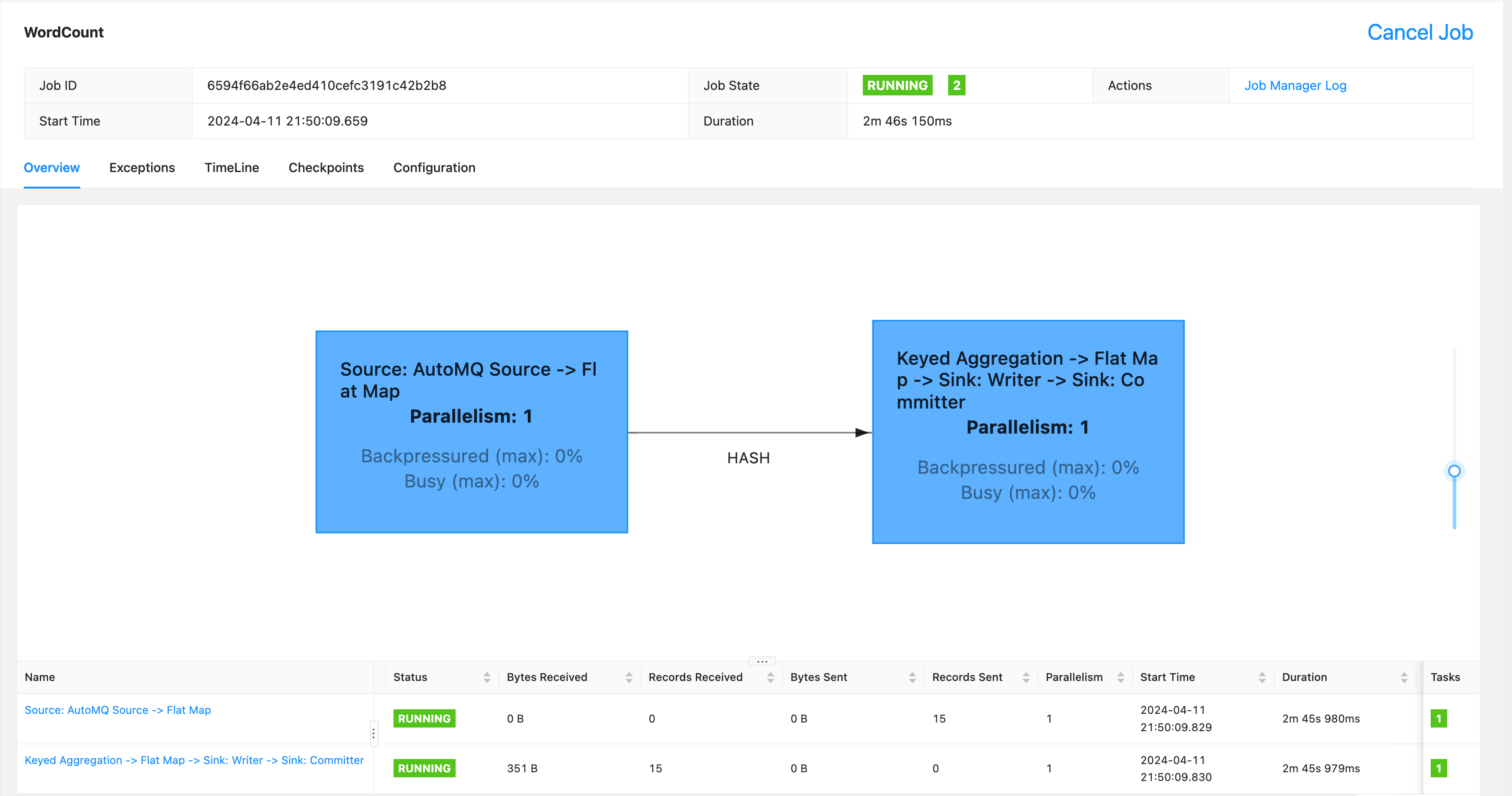/*
* Licensed to the Apache Software Foundation (ASF) under one or more
* contributor license agreements. See the NOTICE file distributed with
* this work for additional information regarding copyright ownership.
* The ASF licenses this file to You under the Apache License, Version 2.0
* (the "License"); you may not use this file except in compliance with
* the License. You may obtain a copy of the License at
*
* http://www.apache.org/licenses/LICENSE-2.0
*
* Unless required by applicable law or agreed to in writing, software
* distributed under the License is distributed on an "AS IS" BASIS,
* WITHOUT WARRANTIES OR CONDITIONS OF ANY KIND, either express or implied.
* See the License for the specific language governing permissions and
* limitations under the License.
*/
package com.automq.example.flink.WordCount;
import org.apache.flink.api.common.eventtime.WatermarkStrategy;
import org.apache.flink.api.common.functions.FlatMapFunction;
import org.apache.flink.api.common.serialization.SimpleStringSchema;
import org.apache.flink.api.java.tuple.Tuple2;
import org.apache.flink.connector.kafka.sink.KafkaRecordSerializationSchema;
import org.apache.flink.connector.kafka.sink.KafkaSink;
import org.apache.flink.connector.kafka.source.KafkaSource;
import org.apache.flink.connector.kafka.source.enumerator.initializer.OffsetsInitializer;
import org.apache.flink.streaming.api.datastream.DataStream;
import org.apache.flink.streaming.api.environment.StreamExecutionEnvironment;
import org.apache.flink.util.Collector;
/**
* This is a re-write of the Apache Flink WordCount example using Kafka connectors.
* Find the reference example at https://github.com/redpanda-data/flink-kafka-examples/blob/main/src/main/java/io/redpanda/examples/WordCount.java
*/
public class WordCount {
final static String TO_FLINK_TOPIC_NAME = "to-flink";
final static String FROM_FLINK_TOPIC_NAME = "from-flink";
final static String FLINK_JOB_NAME = "WordCount";
public static void main(String[] args) throws Exception {
// Use your AutoMQ cluster's bootstrap servers here
final String bootstrapServers = args.length > 0 ? args[0] : "localhost:9094";
// Set up the streaming execution environment
final StreamExecutionEnvironment env = StreamExecutionEnvironment.getExecutionEnvironment();
KafkaSource<String> source = KafkaSource.<String>builder()
.setBootstrapServers(bootstrapServers)
.setTopics(TO_FLINK_TOPIC_NAME)
.setGroupId("automq-example-group")
.setStartingOffsets(OffsetsInitializer.earliest())
.setValueOnlyDeserializer(new SimpleStringSchema())
.build();
KafkaRecordSerializationSchema<String> serializer = KafkaRecordSerializationSchema.builder()
.setValueSerializationSchema(new SimpleStringSchema())
.setTopic(FROM_FLINK_TOPIC_NAME)
.build();
KafkaSink<String> sink = KafkaSink.<String>builder()
.setBootstrapServers(bootstrapServers)
.setRecordSerializer(serializer)
.build();
DataStream<String> text = env.fromSource(source, WatermarkStrategy.noWatermarks(), "AutoMQ Source");
// Split up the lines in pairs (2-tuples) containing: (word,1)
DataStream<String> counts = text.flatMap(new Tokenizer())
// Group by the tuple field "0" and sum up tuple field "1"
.keyBy(value -> value.f0)
.sum(1)
.flatMap(new Reducer());
// Add the sink to so results
// are written to the outputTopic
counts.sinkTo(sink);
// Execute program
env.execute(FLINK_JOB_NAME);
}
/**
* Implements the string tokenizer that splits sentences into words as a user-defined
* FlatMapFunction. The function takes a line (String) and splits it into multiple pairs in the
* form of "(word,1)" ({@code Tuple2<String, Integer>}).
*/
public static final class Tokenizer
implements
FlatMapFunction<String, Tuple2<String, Integer>> {
@Override
public void flatMap(String value, Collector<Tuple2<String, Integer>> out) {
// Normalize and split the line
String[] tokens = value.toLowerCase().split("\\W+");
// Emit the pairs
for (String token : tokens) {
if (token.length() > 0) {
out.collect(new Tuple2<>(token, 1));
}
}
}
}
// Implements a simple reducer using FlatMap to
// reduce the Tuple2 into a single string for
// writing to kafka topics
public static final class Reducer
implements
FlatMapFunction<Tuple2<String, Integer>, String> {
@Override
public void flatMap(Tuple2<String, Integer> value, Collector<String> out) {
// Convert the pairs to a string
// for easy writing to Kafka Topic
String count = value.f0 + " " + value.f1;
out.collect(count);
}
}
}

